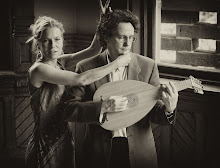
Hallie and I were working on choosing music for the upcoming courtesan concert. I think we've settled on:
Songs from a poetry manuscript collected in the beginning of the 16th c. The collector, Domenico Arrighi has written beside the poems of Maria Cortigiana 'This song was her favorite, and she sang it so well that everyone would fall in love with her on hearing her sing it so beautifully.’etc. I'll intabulate some of the frottolas that Arrighi says she sang. This set is after an article by William Prizer.
Songs by Ippolito Tromboncino. He, a courtesan called Francesca Bellamano, Titian and Aretino used to hang out together. Tromboncino also was Francesca's singing teacher. Aretino has Nanna (an old courtesan) say to Pippa (new at the job) 'Then get the maestri to come and teach you music, getting them to play for you for nothing, paying them with hopes and promises.’ David Nutter suggests the Titan above is of Ippolito singing to Francesca; the body language suggests he's not going to get more than hope tonight, I think.
Songs sung (and played) by Hallie to the lira da braccio to melodic formulas, with poems by Tullia d'Aragona. She wrote many sonnets and the Dialogue on the Infinity of Love after which the concert is named.
Texts by Veronica Franco sung to textless songs in the Bottegari lute book. There are tunes you can plug any terza rima into, sonnets into etc.
Music by Giulio Caccini. He was given a dowry of several times his annual salary to marry the soprano Lucia di Filippo Gagnolanti, who he worked with at the Medici court. According to Timothy Mc Gee, the Medici family wanted to make sure that a Gonzaga family member was not 'shooting blanks', since he had been married before with no issue, before he married their daughter. Lucia, the future Mrs. Caccini, was sent off to Venice to test this out. She came back pregnant. I don't know whether your household getting a massive chunk of money for your sleeping with the boss's future son-in-law passes the definition of courtesan, but the line between 'female singer' and 'courtesan' was pretty fine.
I think I'll play some Francesco da Milano. He worked for Pope Leo X who was a big supporter of the courtesans. And I think I'll play some dances: Thomas Morely says 'The Italians make their Galliards (which they term Saltarelli) plain .... they have courtesans disguised in men's apparel who sing and dance to their own songs.'

